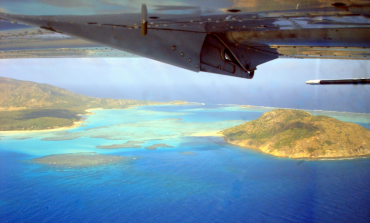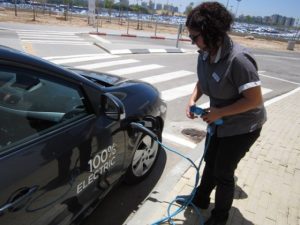 A kibbutz company in Israel leases 100 acres of land off of Bedouins in the Negev Desert to plant new solar panel project. Image via dlisbona
A kibbutz company in Israel leases 100 acres of land off of Bedouins in the Negev Desert to plant new solar panel project. Image via dlisbona
Israel’s Bedouin population may not be the most impoverished among the Bedouin clans in the Middle East, but they are very much marginalized people in need of some good opprtunities. And what could be better than a green ones? A new sunny land deal connects a local kibbutz and two clans, and it is expected to inject monetary resources into the Bedouin community.
Last week the Israeli business newspaper Globes reported that the Arava Power Company has signed contracts to build three solar power fields on land owned by the Tarabin and Abu Karinath Bedouin clans near Lehavim in the Negev.
Arava estimates that NIS 400 million (about $110 million UDS) will be needed to finance the construction of the solar fields, expected to produce 20 megawatts of electricity on 370 dunam (92.5 acres) of land. The company said that the US Overseas Private Investment Corporation (OPIC) will finance 80% of the cost of the solar fields, worth over $300 million.”
Arava Power has pledged to build the fields within four years and to pay NIS 6000 per dunam (about $1,500).
From the point of view of the company, this is only the beginning of a good partnership between it and the Bedouin community in the Negev. The company would like to sign on similar contracts with the Bedouins in the future.
However, Arava Power Company is not the only company which collaborates with the Bedouins on the subject of solar energy. Bustan – an NGO (we’ve covered here), which was founded in 1999 by Devorah Brous and currently headed by Bedouin activist Ra’ed Al-Mickawi, comprised of Jewish and Arab eco-builders, architects, academics and farmers promoting social and environmental justice in Israel and the Palestinian Authority, has partnered in 2008 with solar designers and manufacturers at Interdan to bring solar-powered electricity to Bedouin villages that were not connected to the national grid and which would obtain electricity only by using expensive diesel or gas-powered generators at each family house.
With initiatives conducted by Arava Power Company, Bustan and Interdan, the Bedouins in the Negev will be able to enjoy more sustainable and environmental progress and might have solutions to their major problems, one of which is the lack of electricity in many unrecognized and recognized villages.
Hopefully, more companies will collaborate with the Bedouins on the issue of solar energy, from which everyone can benefit: the Bedouins, the other communities living in the Negev, and the Environment.
Read more on Bedouin and green issues:
Cycling for Peace in Israel
Meet the Green Bedouin Ahmed Amrani
Learn Immersion Arabic in Israel’s Bedouin Solar Village




Interesting points, Moshe! Thanks for sharing. When I was at the village of Lakia, they showed me an ancient well and said that not all the tribe would go wandering. The man of the house would go with one wife, or so, and the others as well as children would stay behind at the well. Is is possible that us westerners have some romantic ideas about the Bedouin way of life? It sounds more like a partially nomadic way of life.
You are raising a very interesting issue here Karin. The nomdas are communities of people who move from one place to another within their ancestral territory rather than settling permanently in one location. Generally speaking, they are divided into three groups according to economic specialization: hunter-gatherers, pasoralists and “peripatetic nomads”. Most of the bedouins are pastoralists who raise herds, driving them or moving with them, in patterns that normally avoid depleting pastures beyond their ability to recover. That is why the Bedouins used to wander from oasis to oasis within very specific territory lines which had been established far away in the past. They used to wander according to the seasons.
Not all Bedouins were full nomads. Some were semi-nomads, i.e., people who usually live in portable or temporary dwellings and practice seasonal migration but have a base camp in which some crops are being cultivated. And, this is the example that you brought from Laqia. But, still, most of the tribe members are wandering around.
There has always been a tension between the state and the Bedouins since in order to rule them, the state wanted to settle them in permanent settlements. This is what is happening in the State of Israel. In order to force them to settle down, the state limits their movements and ability to wander, encourage them to move into the acknowledged settlements and prevents the unacknowledged ones basic services.
Tortured, perhaps, but Bedouin in Israel have it fairly good compared to let’s say the Bedouin in Sinai who don’t have status, or passports.
Depends from which point of view you prefer to see the situation. Bedouins, traditionally, in the Negev as well as in Sinai had not been controlled, as a matter of fact, by any authority, from ancient times. They roamed the desert and prefer to stay that way, without passports and status. For them, the most important thing is to be free and to follow and wander in the deserts as their ancestors did. That is why from this point of view, the Sinai Bedouins are considered to be much better off than the Bedouins in the Negev, whose movements are restricted by the State of Israel.
However, from development and Western point of view, you are right.
But, in the Middle East as in the Middle East, everything is complicated and should be dealt with also from Arab cultural point of view and for the Bedouins, freedom to follow their ancestors ways is a very important value. For some, even much more than development.
This is a great 1st step in the somewhat tortured relationship between the State and the Bedouin. I hope Bibi’s Govy takes it into account during the current land trials taking place in B’sheva this week against the El-Ukbi tribe, trying to return to their land at El-Arakib in the Sayag, and the 17 members of the Twail Abu Jarl tribe arrested this week for trying to return to their ancestral land close by. Also spare a thought for Israeli activist Yeela Ranaan, who works for the Regional Council for the Un-recognised Villages in B’sheva, recently put on trial by the State for photographing house demolitions taking place in Bedouin villages.
Still a long way to go, after 50 plus years, but a good 1st step!